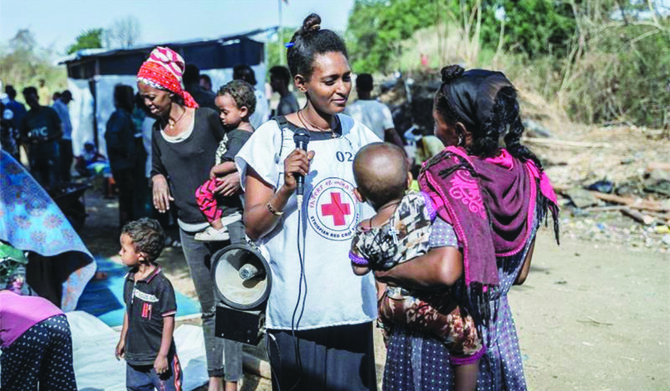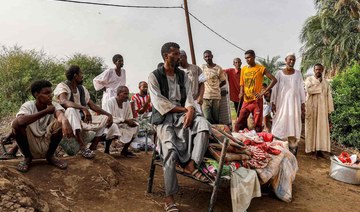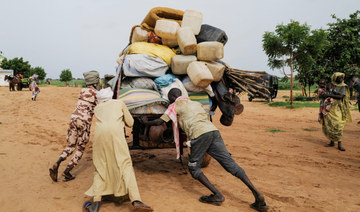UNITED NATIONS: Sexual violence is being committed in Sudan on a “sickening scale,” while fighting in the Darfur region is reopening “old wounds of ethnic tension” that could engulf the country, United Nations officials told the Security Council on Wednesday.
“The alarming accounts of sexual violence that are heard from people who have fled to Port Sudan are just a fraction of those being repeated at a sickening scale from conflict hotspots across the country,” said senior UN aid official Edem Wosornu.
War broke out on April 15 — four years after the overthrow of former President Omar Al-Bashir during a popular uprising. Tensions between the army (SAF) and the paramilitary Rapid Support Forces (RSF), which jointly staged a coup in 2021, erupted over disagreements about a plan to transition to civilian rule.
“The fighting in Darfur continues to reopen the old wounds of ethnic tension of past conflicts in the region,” Martha Ama Akyaa Pobee, a senior UN official on Africa, told the council. “This is deeply worrying, and could quickly engulf the country in a prolonged ethnic conflict with regional spillovers.”
In the early 2000s “Janjaweed” militias — from which the RSF formed — helped the government crush a rebellion by mainly non-Arab groups in Darfur. Some 300,000 people were killed, the UN estimates, and Sudanese leaders are wanted by the International Criminal Court for genocide and crimes against humanity.
The current war has seen more than 4 million people flee their homes, of which 3.2 million people are internally displaced and nearly 900,000 people have crossed the borders into Chad, Egypt, South Sudan and other countries, the UN said.
“The humanitarian impacts are made worse by credible evidence to suggest serious violations of international humanitarian law by both the SAF and the RSF which could amount to war crimes and crimes against humanity,” Britain’s UN Ambassador Barbara Woodward told the Security Council.
Russia’s Deputy UN Ambassador Anna Evstigneeva said Moscow was concerned by the situation in Sudan and pledged support for the Sudanese authorities. She accused Western countries of interfering with the Sudanese internal political process and slammed the use of unilateral sanctions.
Both sides in the Sudan conflict have claimed military advances in recent days but there are no signs of a decisive breakthrough. Efforts by Saudi Arabia and the United States to secure a cease-fire have stalled.
US Ambassador to the UN Linda Thomas-Greenfield told reporters after the council meeting that both sides were responsible for ethnic and sexual violence, adding: “There are no innocents here.”
Sudan’s UN Ambassador Al-Harith Idriss Al-Harith Mohamed told the Security Council that Sudanese troops “are not involved in any sexual or gender violence and the party involved in this atrocity is very well known.”
There was no immediate response from the RSF to the UN Security Council meeting. The RSF has said it is committed to upholding international humanitarian law and would work to prevent any abuses by its forces or others against civilians.
Sudanese suffer sexual violence on ‘sickening scale,’ UN says
https://arab.news/cwt2d
Sudanese suffer sexual violence on ‘sickening scale,’ UN says

- “The alarming accounts of sexual violence that are heard from people who have fled to Port Sudan are just a fraction of those being repeated,” said senior UN aid official Edem Wosornu
- Russia’s Deputy UN Ambassador Anna Evstigneeva said Moscow was concerned by the situation in Sudan and pledged support for the Sudanese authorities
Oil Updates – prices rise on US inventories drawdown expectations, CPI focus

SINGAPORE: Oil prices rose on Wednesday on expectations for higher demand as the US dollar weakened and a report showed US crude and gasoline inventories fell while the release of inflation data may point to a more supportive economic outlook, according to Reuters.
Brent crude futures were up 51 cents, or 0.6 percent, at $82.89 a barrel at 9:30 a.m. Saudi time. US West Texas Intermediate crude futures rose 55 cents, or 0.7 percent, to $78.57 a barrel.
US crude oil inventories fell 3.104 million barrels in the week ended May 10, according to market sources citing American Petroleum Institute figures on Tuesday. Gasoline inventories fell by 1.269 million barrels and distillates rose by 673,000 barrels.
US government inventory data is due later on Wednesday and are likely to also show a drop in crude stockpiles as refineries increase their runs to meet increased fuel demand heading into the peak summer driving season.
“Expectations of another drawdown in US oil inventories should support oil prices,” ANZ Research said in a note.
US consumer price index data is also due on Wednesday and should give a clearer indication whether the Federal Reserve may cut interest rates later this year, which could spur the economy and boost fuel demand.
Oil prices also found support from a softer US dollar and stimulus measures from China, said independent market analyst Tina Teng, with a weaker greenback making dollar-denominated oil cheaper for investors holding other currencies.
Teng was referring to China’s plans to raise 1 trillion yuan ($138.39 billion) in long-term special treasury bonds this week to raise funds to stimulate key sectors of its flagging economy, which is the world’s largest oil importer.
“The US CPI and China’s economic data are key to driving oil prices for the rest of the week,” she added. China will release economic activity data on Friday.
Prices were also supported by concerns around Canadian oil supply, a key exporter to the US
A large wildfire is approaching Fort McMurray, the hub for Canada’s oil sands industry that produces 3.3 million barrels per day of crude, or two-thirds of the country’s total output.
Pakistani deputy PM discusses trade through Khunjerab pass, simplified visa regime with Chinese counterpart

- Pakistani Deputy PM Ishaq Dar is on a visit to China to discuss second phase of CPEC initiative
- New phase shifts focus from infrastructure projects to industrial, agricultural, green energy cooperation
ISLAMABAD: Pakistan and China are pushing to sustain the momentum of the China-Pakistan Economic Corridor (CPEC) as the project enters its second phase, the foreign office said on Wednesday, with the Pakistani deputy prime minister on a visit to Beijing to discuss enhancing trade, including through a major border crossing and a simplified visa regime.
The multibillion-dollar CPEC initiative in which Beijing has pledged to invest $65 billion in Pakistan spans several phases, each with distinct goals and impacts on the region. The first phase began in 2015 and mainly focused on building critical infrastructure, particularly in the transportation and energy sectors.
The second phase expands the focus to include industrial cooperation, agricultural development and the promotion of social and economic development. This phase is also expected to include the development of Special Economic Zones (SEZs), efforts to boost green energy production like hydropower and solar energy and initiatives aimed at modernizing agriculture and increasing exports.
According to an official statement, Deputy Prime Minister Ishaq Dar discussed issues related to bilateral trade and connectivity in a meeting with Chinese Executive Vice Premier Ding Xuexiang during his ongoing visit to Beijing.
“The two leaders held in-depth discussion on the various aspects of bilateral relations including China Pakistan Economic Corridor (Phase-II), trade, economic cooperation and investment,” the foreign office said in a statement.
“Connectivity through Khunjerab border crossing and a simplified visa regime were also discussed. They agreed to sustain the growing momentum of Pakistan-China relations in all areas of cooperation and to further deepen iron-clad Pakistan-China friendship.”
“Deputy Prime Minister and Foreign Minister Dar noted the progress made by CPEC in energy and infrastructure and expressed the confidence at the positive dividends under Phase-II in the fields of industry, agriculture and mineral development,” the statement added.
The foreign office said Dar also expressed condolences with the Chinese official over a March 26 suicide bombing that killed five Chinese workers and their Pakistani driver while they were on their way to the Dasu hydropower project in Pakistan’s northwestern Khyber Pakhtunkhwa province.
The Chinese vice premier expressed his country’s full support to Pakistan in all areas, including the economy, trade and investment and reaffirmed the importance of fast-tracking the implementation of CPEC projects.
UN launches probe into first international staff killed by unidentified strike in Rafah

- Retired Indian army officer Waibhav Anil Kale was on route to European Hospital when killed
- Kale was working with the UN Department of Safety and Security, his colleague also injured
NEW DELHI: The United Nations has launched an investigation into an unidentified strike on a UN car in Rafah on Monday that killed its first international staff in Gaza since Oct. 7, a spokesperson for the UN Secretary General said.
The staff member, a retired Indian Army officer named Waibhav Anil Kale, was working with the UN Department of Safety and Security and was on route to the European Hospital in Rafah along with a colleague, who was also injured in the attack.
Israel has been moving deeper into Rafah in southern Gaza, where more than a million people had sought shelter, and its forces pounded the enclave’s north on Tuesday in some of the fiercest attacks in months.
Israel’s international allies and aid groups have repeatedly warned against a ground incursion into Rafah, where many Palestinians fled, and Israel says four Hamas battalions are holed up. Israel says it must root out the remaining fighters.
In a statement on Monday after Kale’s death, UN Secretary General Antonio Guterres reiterated an “urgent appeal for an immediate humanitarian ceasefire and for the release of all hostages,” saying the conflict in Gaza was continuing to take a heavy toll “not only on civilians, but also on humanitarian workers.”
Palestinian health authorities say Israel’s ground and air campaign in Gaza since Oct. 7 has killed more than 35,000 people and driven most of the enclave’s 2.3 million people from their homes.
His deputy spokesperson Farhan Haq said on Tuesday the UN has established a fact-finding panel to determine the responsibility for the attack.
“It’s very early in the investigation, and details of the incident are still being verified with the Israeli Defense Force,” he said.
There are 71 international UN staff members in Gaza currently, he said.
In its only comment on the matter yet, India’s mission to the UN confirmed Kale’s identity on Tuesday, saying it was “deeply saddened” by his loss.
Israel, which launched its Gaza operation after an attack on Oct. 7 by Hamas-led gunmen who killed some 1,200 people and took more than 250 hostages, according to its tallies, has ordered civilians to evacuate parts of Rafah.
The main United Nations aid agency in Gaza, UNRWA estimates some 450,000 people have fled the city since May 6. More than a million civilians had sought refuge there.
Saudi Arabia’s Red Sea Film Fest CEO, Lebanon’s Nadine Labaki attend Cannes opening night

DUBAI: Mohammed Al-Turki, the CEO of Saudi Arabia’s Red Sea Film Festival, attended the opening ceremony of 77th edition of the Cannes Film Festival as Lebanese actress-director Nadine Labaki posed on the red carpet alongside her fellow Cannes jury members.
Al-Turki took to social media to post pictures from the red carpet, where he posed alongside Jomana Al-Rashid, CEO of the Saudi Research and Media Group. He captioned the post, “Beautiful and inspiring opening night @festivaldecannes repping @redseafilm with @jomanaalrashid! Congratulations Thiery and Iris for a great start for what I’m sure will be an edition that exceeds all expectations,” referring to artistic director Thierry Fremaux and festival president Iris Knobloch.

The opening night film was “The Second Act,” a comedy starring Léa Seydoux and Louis Garrel.
However, before “The Second Act” was screened for the audience, Cannes presented its jury, which includes Omar Sy, Lily Gladstone, Nadine Labaki, Ebru Ceylan, Hirokazu Kore-eda, J.A. Bayona and Greta Gerwig.

The star of the night was US veteran actress Meryl Streep, on hand to receive an honorary Palme d’Or. Taking the stage to receive her honor, the Oscar-winner was greeted with a two-minute standing ovation. Addressing the crowd, Streep remembered words from her mother: “Darling, you’ll see, it all goes so fast.”
Meanwhile, a film from Saudi Arabia will be screened at the film festival for the very first time.
“Norah,” Saudi director Tawfik Alzaidi's feature debut, has been selected in the Un Certain Regard section and will screen with 19 other entries from around the world.
A taste of Indian wada pao, pav bhaji in Pakistan’s culinary hub of Karachi

- The beloved vegetarian Indian street foods were not easy to find in Karachi, promoting Kavita Solanki to start her stall
- In a city that offers wide range of meat dishes, the young Hindu woman offers change of taste, alternative for vegetarians
KARACHI: Kavita Solanki had worked for years as a marketing executive when the young Hindu woman decided last October to quit her job and set up a food cart selling two beloved Indian street foods in the Cantonment Area of Pakistan’s financial capital of Karachi.
Though Karachi is considered the South Asian nation’s culinary hub, and all kinds of foods and cuisines can be found at its thousands of restaurants and street stalls, it was not easy to find wada pao and pav bhaji.
Wada pao comprises a deep fried potato dumpling and chutneys placed inside a bread bun sliced almost in half through the middle. Pav bhaji is a thick spicy vegetable curry served with a soft buttered bread roll. Both dishes originated in the Indian state of Maharashtra.
“I used to search on Google about where I can get pav bhaji and wada pao,” Solanki said as she handed a plate of food to a customer at her stall which has come to be called “Kavita Didi Ka Indian Khana,” or Sister Kavita’s Indian Food, or simply, Kavita Didi's Cart.
“So, I thought that the thing which is very difficult to find in the city, why not start with that.”
The stall started attracting large crowds within a short span of time after opening, Solanki said.
“If you say, okay, let's have nihari today, you know you will go to Zahid Nihari,” she said, naming one of the most famous restaurants in Karachi that offers the slow-cooked beef stew dish. “For vegetarian options, people will recommend Kavita Didi, that okay, let's go to Kavita Didi's stall.”
Solanki said people were attracted to her stall not just because wada pao and pav bhaji were difficult to find elsewhere in the city but also due to the authenticity and taste of the food.
“We are giving proper homemade stuff, nothing artificial,” she said. "What we eat at home is what we are bringing here.”
Solanki, who has never been to India and is ethnically Gujrati, said she learnt to make pav bhaji and wada pao from YouTube videos:
“Once we tried it at home, we liked it. So, like every weekend at home, we would be making this for ourselves.”
The stall is also popular for those seeking vegetarian alternatives and a change of taste from meat-based dishes. And her customers include people from all faiths, the entrepreneur said.
“These are some unique dishes that they offer and it's very clean and very yummy and very nice,” pharmacist Maha Ahmed, a loyal customer, told Arab News.
Sikandar Ali, who works at a private firm, said he was drawn to Solanki's stall after seeing videos on YouTube.
“I had a strong desire to come to Didi's place and taste wada pao. So today, I decided that I would come and have wada pao,” said Ali, who grew up hearing about the street food from his mother, who migrated to Pakistan from India.
“I must say, it tastes absolutely amazing. I had a huge desire to go to India and have wada pao. That same taste I have found in Pakistan, in Karachi.”













